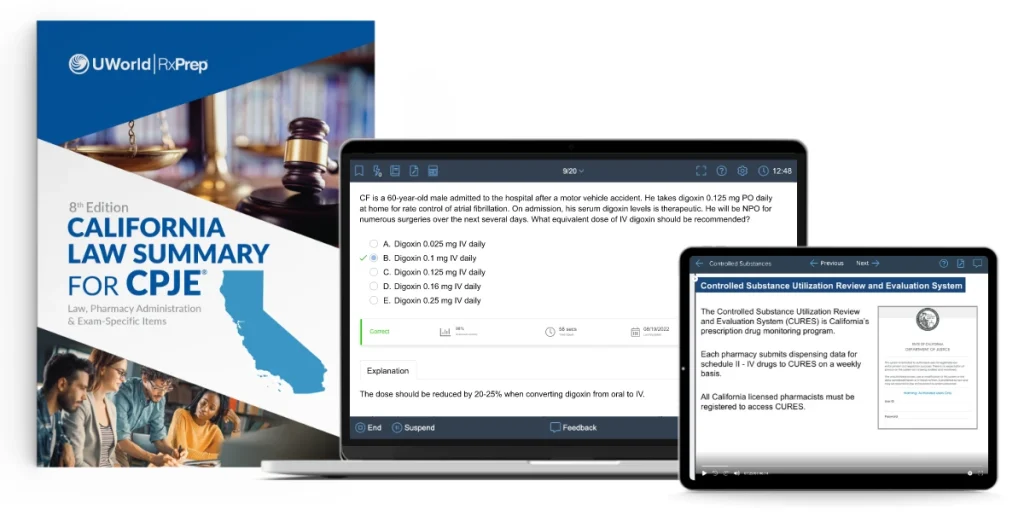CPJE Scoring Guide
To become a licensed pharmacist in the state of California, candidates must pass the North American Pharmacist Licensure Examination® (NAPLEX®), in addition to the California Practice Standards and Jurisprudence Examination (CPJE). The CPJE, developed by the California Board of Pharmacy, tests a candidate's ability to practice pharmacy safely and communicate effectively in a clinical setting while adhering to laws and regulations unique to California. This article details CPJE scoring methodology, minimum passing scores, how results are received, and other topics.
How Is the CPJE Scored?
The California State Board of Pharmacy reports an examinee’s CPJE result as a scaled score from 0 to 99. Examinees must achieve a score within the 75 to 99 range to pass. Any score within the range of 0 to 74 will result in not passing. Scaled scores should not be interpreted as percentages. For example, a scaled CPJE score of 75 does not mean that the candidate answered 75% of the questions correctly, nor does it mean that 75% of examinees will pass (i.e., what might be expected if scores were curved).
The California State Board of Pharmacy administers a number of different exam versions, each with varying degrees of difficulty. Scaled scoring mitigates disparities between exam versions by raising or lowering the passing threshold based on an exam’s relative difficulty.
How are CPJE scaled scores determined?
CPJE passing scores are determined through a process called “criterion-referencing.” First, the California State Board of Pharmacy gathers pharmacists from a diverse range of schools and specializations into a Competence Committee. This committee is tasked with formulating a “minimum acceptable level of competence for safe practices” that candidates must meet to qualify for pharmacist licensure. Once these criteria are set, a psychometric consulting firm accounts for the pharmacists’ behaviors and develops a passing score that corresponds with the minimum competence criterion. Finally, the California State Board of Pharmacy calibrates the passing score to equal 75.
In other words, each unique exam form has a “raw passing score” which is translated into a scaled passing score. To use a metaphor provided by the California State Board of Pharmacy:
“This is analogous to the way one adjusts numeric values in describing the boiling temperature when using Celsius and Fahrenheit temperature scales. The water still boils at the same temperature, regardless of the temperature scale that is used to measure the absolute temperature.”
Why does the CPJE use scaled scores?
CPJE results are reported as scaled scores to ensure fairness. The California Board of Pharmacy administers many different exam versions. Different exam versions may have varying degrees of difficulty. Scaled scoring is employed to lessen this disparity by lowering the raw passing scores of more difficult exams and raising the raw passing scores of easier exams.
What are the CPJE Pass Rates?
The California Board of Pharmacy currently does not release data on average CPJE scores. However, annual CPJE pass rates can be found on the California State Board of Pharmacy website. Data on overall CPJE pass rates for examinees testing between April 2021 and April 2022 are tabulated below.
| Overall CPJE Pass Rates April 2021 to March 2023 | ||
|---|---|---|
| Timeframe | Fail Rate (No.) | Pass Rate (No.) |
| April – Sept 2021 | 44.1% (867) | 55.9% (1100) |
| Oct 2021 – April 2022 | 55.3% (912) | 44.7% (737) |
| May 2022- September 2022 | 36.9 % (624) | 63.1% (1065) |
| Oct 2023- Mar 2023 | 41.2% (457) | 58.7% (652) |
| CPJE Pass Rates April 2021 to March 2023 by Location | |||
|---|---|---|---|
| Timeframe | Location | Fail Rate (No.) | Pass Rate (No.) |
| April – Sept 2021 | California | 38.5% (478) | 61.5% (762) |
| Other US | 53.2% (334) | 46.8% (294) | |
| Foreign | 55.6% (55) | 44.4% (44) | |
| Oct 2021 – April 2022 | California | 55.4% (490) | 44.6% (395) |
| Other US | 55.8% (355) | 44.2% (281) | |
| Foreign | 52.8% (67) | 47.2% (60) | |
| Unclassified | 0% (0) | 1 (100%) | |
| May 2022- Sep 2022 | California | 33.2% (374) | 66.8% (753) |
| Other US | 44.5% (215) | 55.5% (483) | |
| Foreign | 44.9% (35) | 55.1% (78) | |
| Unclassified | 0% (0) | 100% (1) | |
| Oct 2022- May 2023 | California | 41.3% (258) | 58.7% (367) |
| Other US | 42% (167) | 58% (231) | |
| Foreign | 36.9% (31) | 63.1% (84) | |
| Unclassified | 50% (1) | 50% (1) | |
You can increase your chances of passing the CPJE by familiarizing yourself with CPJE-style content. The UWorld RxPrep CPJE Online Course is the number one resource for CPJE preparation and provides an integrated learning platform with content developed by an experienced team of pharmacists and pharmacy law experts. You will gain access to an illustrated CPJE course manual with visual aids and law study tips, supplemental video lectures, a QBank with over 350 exam-style questions, a CPJE practice test, and performance monitoring.
Everything You Need To Pass The CPJE
Frequently Asked Questions (FAQs)
How long does it take to get your CPJE score?
How do you check your CPJE score results?
What is the CPJE regrade procedure?
If you have failed the CPJE and believe that your results may be inaccurate, you can request a regrade from the California Board of Pharmacy for a fee of $115. You must submit a written request to the board of pharmacy with your name and address, exam date and score, the first six digits of your social security number (voluntary), your birth date, your signature, and a check or cashier’s check made out to the “Board of Pharmacy.”
